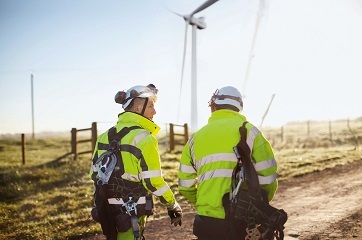ESG: The key to sustainable business success
The article ‘ESG: Schlüssel für den nachhaltigen Unternehmenserfolg’ was published in the 10/2023 issue of Lünendonk Magazin.
ESG criteria provide guidance on the environmental, social and governance aspects of corporate management. Studies show that protecting the climate and being commercially successful can go hand-in-hand. The leaders enjoy a better image among stakeholders, generate more growth in climate-friendly business models, and get more favourable financing and higher valuations on the capital markets.
The European Union’s Corporate Sustainability Reporting Directive (CSRD) will strengthen and harmonise reporting rules in the years ahead. By no later than 2028, around 15,000 companies in Germany will be obligated to document their positive impact on society.
While ESG-related regulations and the resulting reporting requirements mean additional work and expense, they also present an opportunity for companies to stand out from their competitors and position themselves as responsible and attractive employers.
Markets demand sustainability
In spite of all the extra effort involved in an audit, the regulations also provide measurable, transparent criteria for monitoring the sustainable development of businesses. A survey of 125 top managers shows that companies have recognised this and are including ESG criteria in their long-term corporate strategies. The actual reporting that is required is considered less important than the focus on these advantages.
For the multi-technical service provider SPIE, solutions that benefit the climate and a commitment to sustainability are key elements of the company’s business model. SPIE was one of the first companies to transparently publish its contribution to a net zero economy, to have its sustainability efforts measured with recognised tools and to subject itself to annual external audits.
The community unites established companies, start-ups and research institutes that are cooperating on innovative solutions for the energy and mobility transition. SPIE is part of the community and is bringing its extensive multi-technical expertise to bear on the operation of buildings such as those at EUREF Campus Düsseldorf. EUREF Campus Düsseldorf, which is currently under construction, will be the first climate-neutral campus in North Rhine-Westphalia. On its completion in 2024, SPIE Deutschland & Zentraleuropa will move its headquarters to EUREF Campus Düsseldorf and provide its employees with a modern and inspiring workplace.
Moving to the climate-neutral campus is consistent with the sustainability goals of the SPIE Group, which is committed to a 25% reduction of its direct carbon footprint by 2025. This goal is consistent with the reductions needed to limit global warming to 1.5°C (Scope 1 and 2). As a service company, our two most important levers are the energy-efficiency of our buildings and the electrification of our vehicle fleet, as these are the two main sources of the company’s emissions. SPIE also has an eye on its supply chains (Scope 3) and aims to increase the share of its partners who are committed to ambitious sustainability goals to 67% by 2025.
S as in social: safety and equal opportunities
As a technical service provider, SPIE has a great responsibility for its 48,000 employees. Occupational health and safety is our top priority. Continuous improvement, the development of innovative solutions for even safer work, and strategic initiatives are all part of our corporate philosophy. To anchor this, SPIE puts particular emphasis on the example set by management, a strong culture of prevention, regular training, and customer and subcontractor management. This commitment is also a competitive advantage that is acknowledged by customers. For example, SPIE was honoured in 2022 by its customers 50Hertz and Total Energies for its outstanding efforts in occupational health and safety.
In line with ESG criteria, SPIE is committed to equal opportunities for all employees, with particular emphasis on empowering women in the company. With both internal promotions and new hires, SPIE aims to raise the proportion of women in management by 25% by 2025. To make that happen, the company backs initiatives like the So’SPIE Ladies network, which advocates equal opportunities, diversity, and mentoring and training programmes focused on empowering and promoting women as managers.
The extent to which assuming responsibility for our employees in this way reaps dividends can be seen in the current figures for trainee positions in the highly competitive labour market. In Germany alone, over 1,000 people are being trained for 46 skilled trades at SPIE. In the summer of 2022, 300 people began training or dual study programmes with us.
The environmental and social aspects of ESG can only be addressed properly if corporate management is fully committed to ESG targets and establishes appropriate organisational frameworks for achieving them. Interim results need to be monitored and announced in a transparent fashion. All managers at SPIE, up to and including the CEO, are committed to the ESG goals, which are an integral part of our Strategic Plan 2025. And we have already fulfilled the requirement to tie financial incentives to ESG criteria. Performance-based remuneration is linked to indicators such as occupational health and safety and carbon reductions. We also submit to external audits on a regular basis. In 2022, EcoVadis again confirmed that when it comes to sustainability, SPIE is among the most exemplary companies in our sector.
ESG as the key to sustainable business success
The years ahead will be crucial for the future of our society and our economy. The climate crisis calls for a rapid global change in our lifestyles and growth mechanisms and in the way we use our energy resources.
Companies face the challenge of having to bring not only individual processes but often their entire business models into alignment with sustainability criteria in order to remain attractive to all relevant stakeholders. For companies that are willing to take the goals seriously and to appropriately align and systematically implement their strategies to this end, ESG is more than just a means of business development, it’s the key to sustainable business success.
About the authors
Markus Holzke has been Managing Director / CEO of SPIE Deutschland & Zentraleuropa since 2014 and is a member of the Executive Committee of the SPIE Group. In this capacity, he is responsible for the multi-technical service provider’s forward-looking development and growth in Germany, Austria, Poland, Slovakia, Hungary and the Czech Republic.
Isabelle Lambert is a member of the Executive Committee of the SPIE Group. As Director of CSR, she is responsible for sustainable development at the company, in particular with regard to growing climate-related services, reducing carbon emissions, improving occupational health and safety, and increasing the percentage of women in management.
Dr. André Schimmel is a Member of the Management Board of SPIE Deutschland & Zentraleuropa. As the Strategy & Development Officer (CSO), he is responsible for digital transformation, procurement, business development and sales, HSEQ, IT, communications and PMI.
Bianca Stöhr is a Member of the Management Board of SPIE Deutschland & Zentraleuropa. As the Head of People, Culture & CSR, she is responsible for human resources and for the multi-technical service provider’s positioning as an employer of choice.


